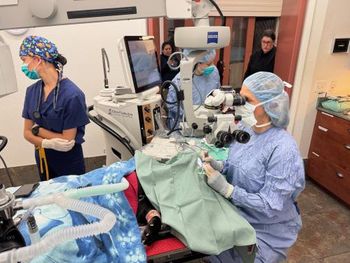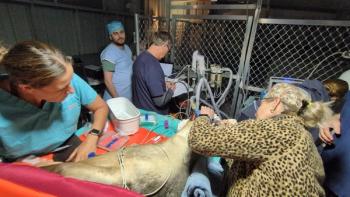
Just Ask the Expert: How do you treat conjunctival infections?
Treating the primary cause is indicated in most conjunctivitis cases.
Dr. Gionfriddo welcomes ophthalmology questions from veterinarians and veterinary technicians.
How frequently should antibiotic ophthalmic solutions be applied for most bacterial conjunctival infections?
Wayne L. Hunthausen, DVM
Animal Behavior Consultations
Westwood, Kan.
There is not a standard answer for this question. It's important to remember that primary bacterial conjunctival infections are rare in domestic animal species except for cattle, which get Moraxella bovis keratoconjunctivitis. Most bacterial conjunctival infections in dogs are secondary to keratoconjunctivitis sicca (KCS) or severe allergies. In cats, conjunctivitis is usually viral in origin, and bacterial conjunctivitis can develop secondarily. Thus, treating the primary cause is indicated in most conjunctivitis cases.
Juliet R. Gionfriddo, DVM, MS, DACVO
You should also administer ophthalmic antibiotics in most of these cases of secondary bacterial conjunctivitis. The type and frequency of administration should be based on the severity of the infection and the suspected organism. The type of organism involved should be determined by bacterial culture and antimicrobial sensitivity testing, but preliminary cytologic examination results from a conjunctival scraping can help you choose an appropriate initial antibiotic. If bacterial cultures or cytology cannot be done, choose a broad-spectrum antibiotic.
Another consideration is the frequency of antibiotic administration, which should be based on how well you think the owner will comply. In severe infections in which much purulent exudate is present, hourly or every-two-hour administration could be appropriate. In most moderate to mild infections, ophthalmic antibiotic solution or ointment administration three to four times a day is probably sufficient.
Juliet R. Gionfriddo, DVM, MS, DACVO
Department of Clinical Sciences
College of Veterinary Medicine and Biomedical Sciences
Colorado State University
Fort Collins, CO 80523
Newsletter
From exam room tips to practice management insights, get trusted veterinary news delivered straight to your inbox—subscribe to dvm360.




